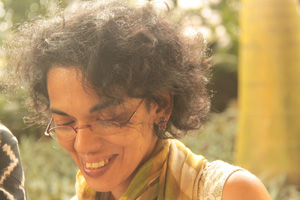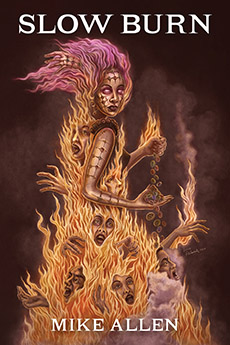Featured Poem • July 2013
Ahalya: Deliverance
Karthika Naïr
I. Glosa: No More

No more now do I have to wait.
No longer now, those cascades, do they rush.
In a hamlet of my eyes, dreams once dwelt at night.
If touched, they would flow; if asked, they would reply:
“There is no trusting volant dreams.”
—Gulzar, Ab mujhe koi intezaar kahan (Ishqiya, 2010)
Translation by KN
No. No more. No more lies, no lapses. No more myths
sown on time from slivers of early monolith,
the mirror you call truth. Ballads sail down millennia,
hurl livid blooms—kapala, shapita, kalankini….
wretched, accursed, adulteress—on my name, smithed
once from heaven’s ore. Denigrate
me no more—or not yet: hear first, and firsthand, from women
like me, the tales they never sing—the myth-makers, the saints,
the gods. Stones, too, can rise in spate.
No more now do I have to wait.
For it is time. Time to rouse the skies, reinstate
Earth’s archives, seek the seas’ lost chants. They’ll vindicate
virtue, speak in my stead, resound: I am she, Ahalya.
Mahabhagha. Mind-born to Brahma. Flawless. Free—free, like
thought was, and should be. Eternal. Inviolate.
The first maiden, forged, full-grown, in the hush
of nascent time; matter mixed and cast with planets, seasons,
stars. They said he’d minted dusk’s flame for my lips; shaped rivers—
their flow, their tumble—from my tresses. (They’re lush
no longer now, those cascades. Do they rush
out—pale, fraught—to drown underground? But I digress).
Yes, my father—architect of three worlds, no less—
had decked virgin moon with my glow, scattered the smells of spring
between my thighs, my breasts; smiled in naïve, paternal pride
then summoned gods, gandharvas, yogins, nymphs, “Witness
these new wonders.” Like fruit flies to coloured delights
they gathered, buzzing in envy, awe, greed and lust. Desire
spread in nitid plague: some clamoured earth; one, thunder; one bid
for death. I’d be the big prize—not love to requite.
In a hamlet of my eyes, dreams once dwelt at night—
once. Now, this scene walks there, sleepless: Brahma, aghast,
skirting whirlpooling plaints, seeks shelter in the mast
of a seer’s voice, ‘Chattel she shan’t be. No creature may claim
earth, air, heaven. Ahalya binds all three. Them I worship,
her I’ve guarded.’ Thus does great Gautama, steadfast
scripter, win my hand: with words fluid and spry.
Thus do fathers belie their own premises; swap suffrage
for safety. In fear lies the key. But I, unafraid,
am not heard, nor asked, for desires are not coy.
If touched, they would flow; if asked they would reply:
‘We are born to soar, not self-destroy.’ Thus was I
wed—with sour gods to witness, dark rain to defy
the bond Agni alloyed—then sent, in fulgent wrapping, with
this aged, agelast, sudden spouse. Co-wives, their scions
and sacred books of cosmic law would await my
service: what else could, my sire deemed,
reflect my worth? ‘No human should hope for more, devotion
will now be your awl. Amsa of my breath, forget the lore:
those pledges you cannot redeem.
There is no trusting volant dreams.’
II. Glosa: Until late have I stayed awake

Until late have I stayed awake, let me sleep awhile.
A trace of the night remains; wait, let morning appear.
Those half-grown dreams that could not be fulfilled…
Let me sow, in my sleep, those dreams once more.
—Gulzar, Jaage hain der tak (Guru, 2010)
Translation by KN
Time was all things: tenebrous, tall, sometimes winged. Peat
were my days, growing piles of wet, spent earth replete
with husks of dead rites and prayer, untold hermits to serve.
Like tendrils of smoke blew dawn and dusk—weightless, swift as grace.
Then night. Night was the triffid that prowled the mind’s streets,
sucking every sense. Night when Gautama would exile
my will, his mouth sowing into my skin cobalt letters,
twenty-eight chapters, a thousand texts on women’s dharma,
four varna, the rank and file of sins, the price of guile…
‘Until late have I stayed awake, let me sleep awhile,’
even those sutra would plead, whilst I—frontispiece
for his wisdom, his virtue, his spells—craved release
from safety. From the words thrust in my veins, cauled in lore, rose
Shatananda, my husband’s son. Another sainted one,
warm and tender as rime. But no more threnodies,
for you seek else: the reason for my eternal smear.
You may know the who, the what, the where-and-when: Indra, lord
of heaven, came in Gautama’s guise, clamouring congress.
I’d laughed, undeceived: ‘Such knaves, you gods that men revere!
A trace of the night remains; wait, let morning appear,
Ô heedless king, breach not occult walls from inside.
The sage and son walk in with dawn: through her chinks, slide
out unseen, unharmed.’ Was it chagrin, fear or shades softer,
less certain, that made the rake blurt, ‘I covet, never court;
win, with arms or wile. But this time, you shall decide.’
Truth and choice: two strangers, my whys. Greed stilled
at the edge of doom, the monarch bowed. And I claimed: the nape
of his neck, an instep, both palms, then the flanks, that groundswell
of lust … marked all with lips which had distilled
those half-grown dreams that could not be fulfilled.
I chose, yes, chose that once to become beloved.
I reclaimed this self. Of the rest, so much—smudged—spread
into legend: the spouse’s fury, the son’s desertion,
Indra’s odium, my stigma as stone, then redemption.
Most, I let be. But rivers die from truths unsaid,
hence one more: Lord Rama did not restore
my form. I live as agate, granite, quartz—this, the blessing
I asked, and obtained: let me be igneous, everywhere.
Let me retrieve the lustrous dreams of yore.
Let me sow, in my sleep, those dreams once more.
Bibliography
- Pachkanya: women of substance by Pradip Bhattacharya
- The Ramayana by Valmiki (General Books LLC, 2010)
- In Search of Sita: Revisiting Mythology edited by Namita Gokhale & Malashri Lal (Yatra/Penguin Books, 2009).
 Karthika Naïr is the author of a poetry collection, Bearings (HarperCollins India, 2009), DESH: Memories, inherited, borrowed, invented (MC2, Grenoble, 2013) and the forthcoming The Honey Hunter/ Le Tigre de Miel (Young Zubaan, India, and Editions Hélium, France). She also scripted Desh, choreographer Akram Khan’s 2012 Laurence Olivier Award-winning dance production, together with performance poet PolarBear and Khan himself. In her résumé as dance producer, one finds mention of Sidi Larbi Cherkaoui, Käfig/Mourad Merzouki, the Louvre, the Shaolin Temple, misadventures with ninja swords and pachyderms, among others.
Karthika Naïr is the author of a poetry collection, Bearings (HarperCollins India, 2009), DESH: Memories, inherited, borrowed, invented (MC2, Grenoble, 2013) and the forthcoming The Honey Hunter/ Le Tigre de Miel (Young Zubaan, India, and Editions Hélium, France). She also scripted Desh, choreographer Akram Khan’s 2012 Laurence Olivier Award-winning dance production, together with performance poet PolarBear and Khan himself. In her résumé as dance producer, one finds mention of Sidi Larbi Cherkaoui, Käfig/Mourad Merzouki, the Louvre, the Shaolin Temple, misadventures with ninja swords and pachyderms, among others.
Karthika describes her poem, “Ahalya: Deliverance,” as “a retelling of a minor episode in the the Ramayana, that of Ahalya, the first mortal woman, born from the head of Brahma (the creator of the universe), and a household name in South Asia, a symbol of the misfortune that can strike a woman for no fault of her own.
Ahalya—though coveted by the entire Hindu pantheon for her beauty—is given away by her father to the old sage, Gautama, as reward for protecting her virtue. But Indra, king of the gods, who had greatly desired her, won’t let a small detail like marriage stand in the way. So, one night, he comes to the hermitage when Gautama is away; he comes disguised as her husband and Ahalya unwittingly commits adultery. Gautama catches them, curses Indra and reduces Ahalya to stone. Gautama later relents—in a manner of speaking—and declares she can regain her human form when a god’s foot touches her. Legend has it that roughly a thousand years later, a young Rama passes through the hermitage with his brother and their guru, Vishwamitra—a rare, enlightened being who praises her as a truly virtuous woman and enjoins Rama to grant her salvation. Rama bows before her, Ahalya comes to life and—mystifyingly—returns to her husband. Yes, the same bloke who transformed her into a block of granite.
“My poem deviates from the standard versions of the myth at two significant moments. Ahalya recognizes Indra when he comes in Gautama’s form but she sleeps with the god for reasons that are explained in the story. And at the end, the deliverance she asks for is not reunion with her husband, or even a return to the human form. It is another, somewhat extreme, form of freedom that she reclaims and obtains.
“I wrote the poem in two movements, both glosa. As the first mortal woman who lived in the age of the genesis of the universe, and as someone ‘frozen’ for thousands of years, Ahalya inhabits a certain ancientness, which I wanted conveyed through both her being and her words, as though we were in the presence of a sentient ruin.”
![]()
If you’ve enjoyed what you’ve read, please consider pitching in to keep us going. Your donation goes toward future content.
![]()















